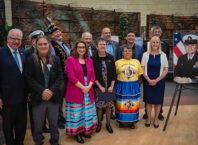OGLALA SIOUX TRIBAL COUNCIL SUSPENDS
PRESIDENT
PINE RIDGE, S.D. – The Oglala Sioux
Tribal Council suspended President Bryan Brewer following allegations
that he acted without the council’s approval on two occasions and
mishandled a $5,000 check.
The council voted 10-5 on June 24 to
suspend Brewer until July 17, when a hearing is scheduled to
determine whether he should be reinstated or impeached, Councilman
Garfield Steele said. Brewer will be given an opportunity to defend
himself at the hearing.
"I support the president,"
Steele said. "I support a lot of things that he’s done. He’s
done good things and the reason why I voted to accept this was to
allow him to give his side of the story."
Steele said the complaints against
Brewer allege that he signed over the tribe’s power of attorney in
order to approve bonds without the council’s consent, that he
approved health benefits for the tribe’s former casino manager
without the council’s consent, and that he mishandled a $5,000
donation a business made to the tribe. Steele did not say what Brewer
is alleged to have done with the money.
A tribal judge will oversee the July
17 hearing, with the eventual decision on Brewer’s future left to the
council. It would take a two-thirds vote of the 19-member council to
remove Brewer from office.
HO-CHUNK NATION APPEALS ELECTRONIC
POKER GAME DECISION
BLACK RIVER FALLS, Wis. – The
Ho-Chunk Nation of Wisconsin is fighting a court order to remove
electronic poker games from one of its casinos.
The tribe installed PokerPro at the
Ho-Chunk Gaming Madison. A February 2009 opinion from the National
Indian Gaming Commission determined that the devices fall into the
Class II category, outside of state control.
Judge Barbara Crabb, however, said the
machines fall Into the Class III category. Since Class III gaming
isn’t allowed at the Madison location, the tribe must remove the
games, she concluded in a decision earlier this month.
“The Nation began offering video
poker only after it received the OK from the Nation Indian Gaming
Commission, which is the federal oversight agency for Class II gaming
and the appropriate authority in this matter," President Jon
Greendeer said in a press release announcing plans for an appeal.
The case will go to the 7th Circuit
Court of Appeals.
S.D. TRIBES SEEK CONTROL OVER CHILD
WELFARE PROGRAMS
PIERRE, S.D. – Five South Dakota
tribes are seeking more control over child welfare programs that are
currently handled by the state.
The Cheyenne River Sioux Tribe, the
Crow Creek Sioux Tribe, the Standing Rock Sioux Tribe, the Oglala
Sioux Tribe and the Yankton Sioux Tribe filed applications to run
their own Title IV-E programs. Their action comes amid concern that
too many tribal children are being placed in non-tribal homes.
"I think the Lakota Nation feels
very strongly that the state is derelict in its duty," Matthew
Renda of the Lakota People’s Law Project, which helped the tribes
prepare their applications, told The Sioux Falls Argus Leader.
According to the project, the Rosebud
Sioux Tribe was the first in Indian Country to receive Title IV-E
planning dollars. The tribe was awarded $300,000 from the Department
of Health and Human Services last year.
Indian children make up 13.8 percent
of the state population yet they represent 56.3 percent of the foster
care population, the report said. Of the 440 Indian children in
foster care as of July 2011, 87 percent were placed in non-Indian
homes while 39 Indian foster homes went empty, according to the
group.
The Oglala Sioux Tribe and the Rosebud
Sioux Tribe are currently suing the state, alleging non-compliance
with the Indian Child Welfare Act and violations of Indian parents’
constitutional rights.
ONEIDA NATION ASKS BANK OF AMERICA TO
BREAK WITH NFL TEAM
ONEIDA, Wis. – The Oneida Nation of
Wisconsin asked Bank of America to break ties with the Washington NFL
team, a tribal leader said.
Brandon Stevens, a council member,
said tribes do a lot of business with the bank. But talks broke off
last year.
"We want to put this in economic
terms. We want to put them in a position where they have to say ‘yes’
or ‘no’ on the name," Stevens told The Washington Business
Journal.
The tribe is also pressuring FedEx
over the shipping giant’s connections to the team. FedEx holds naming
rights on the stadium in Maryland where the team plays, and its
president, Fred Smith, is a member of the team’s ownership group.
FORMER WHITE EARTH CHAIR LAID TO REST
WHITE EARTH, Minn. – Darrell "Chip"
Wadena, a former chairman of the White Earth Nation, was laid to rest
on June 28 and so was the debt he owed to his tribe.
Wadena led the tribe from 1976 to 1996
and was considered a political powerhouse in Minnesota and in
Washington, D.C. But the self-described "Super Chief" faced
criticism at home for his strong-arm tactics and eventually was
convicted of conspiracy, bribery, money laundering, theft and
embezzlement charges.
Wadena was convicted of conspiracy,
bribery, money laundering, theft and embezzlement charges for
cheating the tribe in a business deal. He served 33 months in prison
and was ordered to pay $585,287 in restitution.
Wadena paid $100,000 in 1999 and
started making monthly payments to the tribe. But he apparently
lapsed at some point and only paid a total of $198,719.09.
With penalties, he owed another
$731,608.75, according to the paper. The debt has been wiped clean
due to his death last week at the age of 75.
“I want people to remember him for
the good he has done,” Chairwoman Erma Vizenor, who was challenged
by Wadena when he tried to make a comeback in 2004, told The
Minneapolis Star Tribune. “Serving in tribal office is not an easy
job.”
FEDERAL GOVERNMENT SENDS $50 MILLION IN
BUY-BACK TO ROSEBUD SIOUX TRIBE
ROSEBUD, S.D. – The Interior
Department has sent out $50 million in offers to landowners on the
Rosebud Sioux Reservation in South Dakota.
The success of the Buy-Back Program is
vitally important to the future of Indian Country,” Assistant
Secretary Kevin Washburn, the head of the Bureau of Indian Affairs,
said in a press release today. “Consolidating and returning these
lands to tribes in trust will have enormous potential to unlock
tribal community resources. We are committed to exhausting all
efforts to make sure that individuals are aware of this historic
opportunity to strengthen tribal sovereignty by supporting the
consolidation of Indian lands."
The $3.4 billion Cobell settlement
authorized $1.9 billion for land consolidation. DOI is using the
money to buy fractionated interests from landowners in order to
return the land to tribal governments.
Participation is entirely voluntary.
DOI will pay "fair market value" as required by the Indian
Land Consolidation Act.
Since the start of the program late
last year, Indian landowners have received $67 million for their
fractionated interests. Nearly 190,000 acres have been transferred to
tribes.






